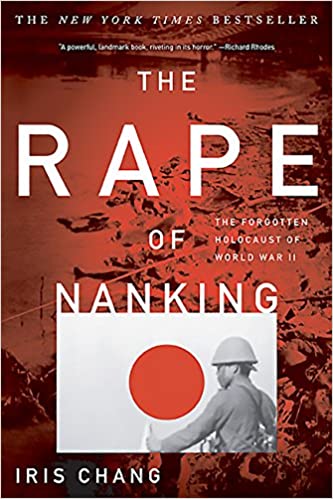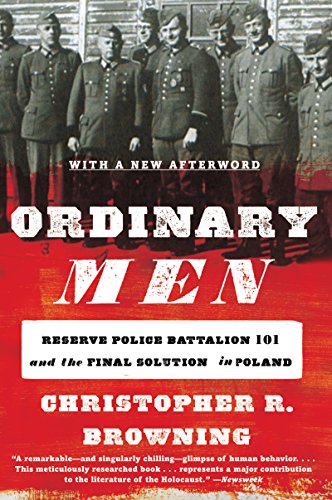I recently read The Rape of Nanking by Iris Chang and Ordinary Men by Christopher Browning. Both of these books were horrific, enlightening, and well-documented.

The Rape of Nanking details the holocaust perpetrated by the Japanese military against the people of Nanking, China. The details are not for the faint of heart. The Japanese treatment of the Chinese in Nanking was the most heinous account of war crimes that I’ve ever read about.
More people died in Nanking than Hiroshima and Nagasaki combined.
Ordinary Men details German Reserve Police Battalion 101 and the genocide they committed against the Polish Jews. Most of these Germans were not Nazis. They were mostly older and middle-aged blue collar men. None of them had been in the Nazi youth. Yet they carried out their orders to exterminate unarmed civilians, many of them women, children, the elderly, and even infants. A very small percentage of these soldiers refused to participate. Many others came to enjoy their work or at least tolerate it. They became numb to their humanity, viewing the Jews as animals to be exterminated.
In Nanking and Poland, the majority of these men followed orders, and many others engaged in depravity far beyond the orders. These men were not especially evil, nor are they particularly different from men today.
In 1961, Yale psychologist Stanley Milgram conducted a series of studies to determine obedience to authority. He found that approximately two-thirds of the people he tested would shock someone to death simply because a man in a white lab coat told them to do so.
In The Perils of Obedience, Milgram wrote:

The legal and philosophic aspects of obedience are of enormous importance, but they say very little about how most people behave in concrete situations. I set up a simple experiment at Yale University to test how much pain an ordinary citizen would inflict on another person simply because he was ordered to by an experimental scientist. Stark authority was pitted against the subjects’ [participants’] strongest moral imperatives against hurting others, and, with the subjects’ [participants’] ears ringing with the screams of the victims, authority won more often than not. The extreme willingness of adults to go to almost any lengths on the command of an authority constitutes the chief finding of the study and the fact most urgently demanding explanation.
People today think if they had been a German citizen during WWII, they would’ve hid Anne Frank in their attic. They would’ve opposed the Nazis. Most don’t know about Nanking, but if they did, I’m sure they would believe that they would’ve opposed imperial Japan. They certainly wouldn’t have participated in the wholesale rape and murder of the Chinese people in Nanking.
Milgram’s work tells a different story. Most people will obey.
There were heroes in these brutal historical accounts. Chinese people gave their lives for their friends and families. Americans and Europeans who lived in Nanking at the time set up a safe zone that saved at least 200,000 people. Ironically, one of the biggest heroes was also the leader of the Nazi party in Nanking. John Rabe confronted Japanese soldiers with nothing more than his Nazi armband and stern words. He stopped countless rapes and murders. He housed Chinese people in his home and when they ran out of space, they camped in his yard. He often had to run out to his yard in the middle of the night to prevent Japanese soldiers from stealing women who were camped there.
Setting aside sociopaths, we all have the capacity for good and evil. It’s easy to do what’s right when there’s nothing personal at stake. The true measure of a person is what they do when doing the right thing will cause personal hardship. John Rabe did the right thing, risking his life in the process.
